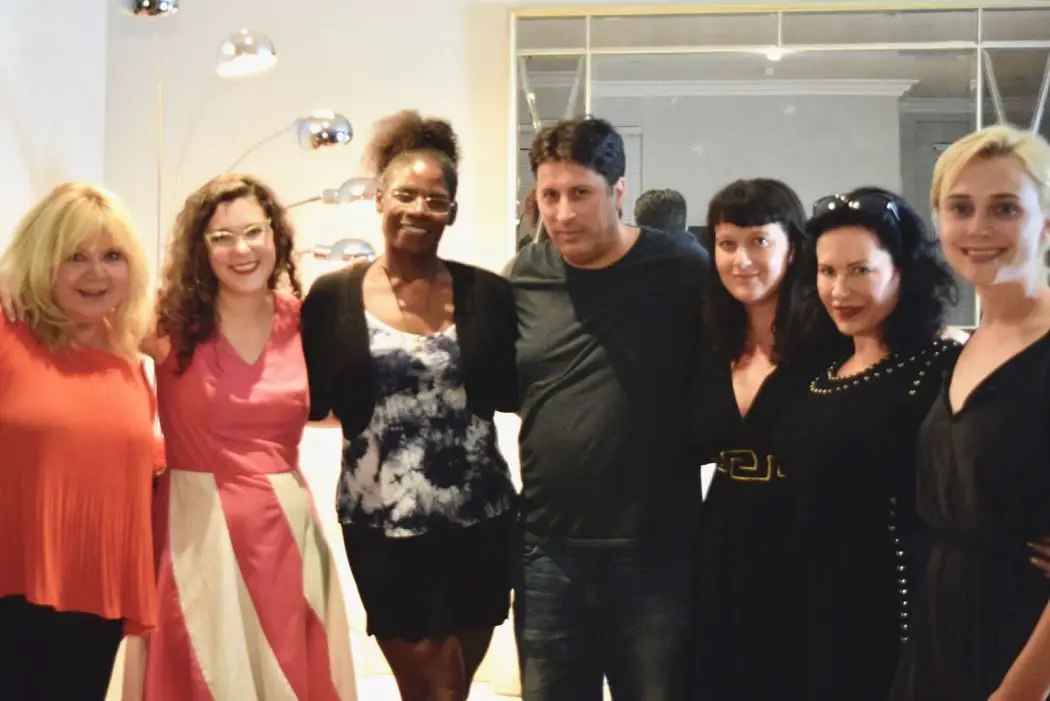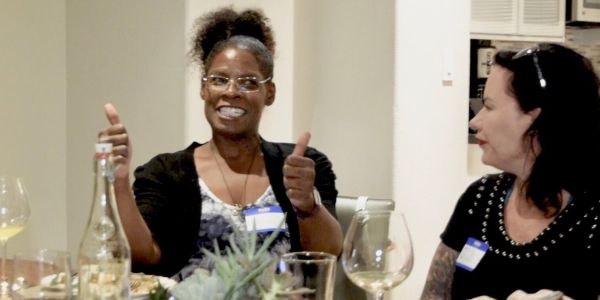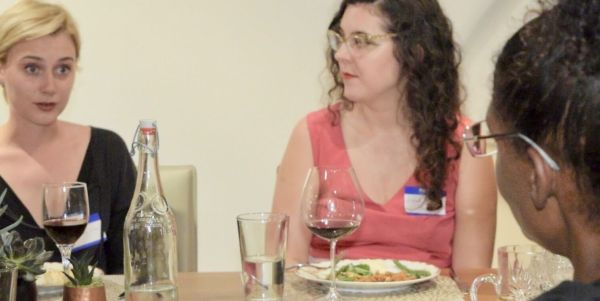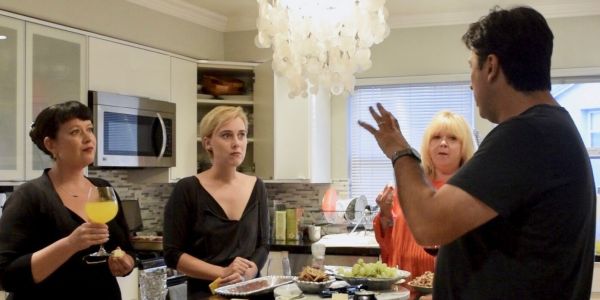Dinner With Dames #10, With Byron Willinger (Recap)

All articles contributed by people outside of our team are…
Dinner with Dames Case File
Who: Byron Willinger, writer of The Commuter & Cinefemme board, sponsorees, and volunteers – Gretchen Ash, Cheryl L. Bedford, Michelle Kantor, Brenda Lee Lau, Josi Kat Mann, Jenna Payne, and myself, Stephanie Wain
What: Dinner 1.10 – a casual discussion on industry issues facing women & ways to excel in their careers over dinner & drink
When: Wednesday, August 30, 2017
Where: A house in Culver City
Why: To propel women to bigger and better career opportunities within studios and networks
Announcing that you’re aspiring an screenwriter at a family party is always an awkward problem. “What do you do for a living?” Oh, me? I took my two college degrees and have been nannying part time on the rich side of LA so I can afford days off to work on my screenplay. “I see. So you must really like babies?” Pass the butter, and my self-esteem often grows a nice gap between my Hollywood screenwriting dreams and my day job. But going to Cinefemme’s Dinner With Dames with Byron Willinger gave me a better perspective.
“It took me seven years after college to break in with a script. From Greenwich Village food tours to working corporate A/V, I’ve done it all.” Byron was honest. I felt at home. Too often at these film industry social gatherings, people shake hands with their resumes first, and things start to feel a little guarded and intimidating. I was happy to hear that someone like Byron Willinger, whose feature film, The Commuter, premieres next year, has written over thirty screenplays in his lifetime.
“Being a writer is like being on a rollercoaster. It’s emotionally exhausting if you bank on every promise given to you… and even then projects fall through. Producers disappear… but the best arsenal you can carry is your skill set as a writer because it’s what you can control,” Willinger offered.

I personally came to LA after being a finalist in Indiewire’s Project of the Year for a student feature film I made while I was an undergraduate at Penn State University. Hopeful, eager, ambitious… I’ve had a host of seemingly great opportunities from promises of having a feature I had written produced to landing a manager… to watching these dreams die fast in a cloud of “we’ve changed our mind” smoke.
I’ve humbly enrolled myself in a screenwriting workshop through Corey Mandell’s Professional Screenwriting and Television Writing Workshop, and have focused solely on bettering my craft… the one thing I can control.
“Screenwriting is a numbers game. You need two pieces of original material per year minimum to be competitive. Don’t work on the same script for five years and put all your eggs in one basket. Some scripts might be great but for twelve reasons aren’t what the studios are looking for at the time. Don’t get discouraged. If you want to be a writer, you need to write,” said Byron Willinger.

Dinner With Dames was a casual and intimate potluck at Cinefemme’s executive producer Michelle Kantor’s home. There were six women who attended who had varying levels of experience from seasoned professionals working at studios like Brenda Lee Lau, and Cheryl L. Bedford working at Awesomeness TV after producing and line producing sixteen independent films. We talked about the difficulty of being women in this business but also the hardship people face when they are not afforded the opportunity to learn the industry.
One of the more pungent and personal parts of the evening was a discussion on creating more opportunities for women of color in spaces such as Hollywood, where films have often been dominated by stories of and by white cis males. How do we actively seek out minority groups so that they feel like their stories are wanted and welcomed by studio heads? How do we combat the ageism facing more seasoned writers who may seek diversity programs that aren’t necessarily aimed for them? How do we include those who’ve been systematically excluded?
Bedford spoke passionately about the need to stay out of the studio system due to lack of opportunities for women of color, especially in her generation. She also recommended recruiting at historically black colleges like Howard University if studios were truly interested in creating a path for people of color to be competitive in a studio market. The co-host of Dinner with Dames, Jenna Payne, talked about CAA’s decade-long effort to build the infrastructure to increase and support diversity within its own staff and clients. Brenda Lee Lau also spoke on the industry’s behalf, saying that there are diversity programs for writers but agreed that it’s not enough to combat years of systemic exclusion.
“I always joke that my professors in college said all you needed to do was show a studio head your NYU degree, and you’d get hired… but it’s never been the case,” said Byron Willinger.

These were words I needed to hear. I’ve been in LA for over two years after graduating with dual degrees in film/video and gender studies from Penn State University. I’ve interned for BuzzFeed Motion Pictures, and I’ve spent ten hours holding a crying snotty baby with a grade A fever. I’ve been on film sets, and I’ve met so many women carving out their own paths with the hopes of one day being a paid writer/director. The bad news: there is no one set path. The good news: we can band together and try to learn from each other as we grow into our careers.
“Don’t stop writing. Write every day. Find a writing partner and keep yourself in check. The life of a writer is a rollercoaster of peaks and valleys, and you have to take the wins when you get them because they might come few and far between.” Good advice from someone who has seen so much in Hollywood.
At Cinefemme’s Dinner with Dames, I passed the butter without sacrificing my self-esteem when someone asked me, “What do you do for a living?” Like Byron Willinger in his early days… I’m a screenwriter with a day job, and I’m humbled to be alongside other women who are pioneering the path.
Video by Gretchen Ash
About Cinefemme:
Cinefemme is a 501(c)(3) non-profit organization founded by women filmmakers, for women filmmakers in 2002. Cinefemme provides fiscal sponsorship to women filmmakers and artists, as well as peer-to-peer networking, mentorship, and strategy for project fundraising. By advancing women’s careers in film and the arts, we empower women’s voices to create gender parity in the arts and equal representation in the media.
About Stephanie Wain:
Stephanie Wain is a writer/director/actress from the East Coast. She is currently enrolled in the Professional Television and Screenwriting Workshop taught by Corey Mandell and has taken classes at The Groundlings. Her latest feature script, Lizzietish, was a quarterfinalist in the 2015 Scriptapalooza, and she is the co-chapter leader of the Cinefemme Director’s Collective.
While studying Film/Video and Women’s Studies at Penn State University, she made a student feature length film, Stones We Throw, which was featured in the running on IndieWire for 2014 Project of the Year. She was a finalist/winner of the TBS National College Comedy Competition, performing live musical comedy. She also worked freelance for Chain Camera Pictures on their latest project, The Hunting Ground, as a student shooter.
She has interned at BuzzFeed Motion Pictures and created viral comedy content dealing with divorced parents and feminism. Her work focuses on female centric stories that relate to the LGBTQA community and are equal parts funny and dramatic.
Does content like this matter to you?
Become a Member and support film journalism. Unlock access to all of Film Inquiry`s great articles. Join a community of like-minded readers who are passionate about cinema - get access to our private members Network, give back to independent filmmakers, and more.
All articles contributed by people outside of our team are published through our editorial staff account.













